A. Vivaldi "Pori rock" - history, obrobki, cikavi facts, rumors. Vivaldi "Pori Roku" - history history
Pori rock
12 characteristic pictures for piano.
Tchaikovsky's "Pori Rock" is a wonderful musical composer's composer, who imagined his dear heart of life, animation and pictures of nature. Yak piznishe zgaduvav yogo brother M.I. Tchaikovsky: "Petro Illich, yak ridko hto, loving life<...>A skinny day is significant for a new meaning and goodbye to it, you will be summarily out of your thoughts, so that from your experience you will not lose a goodbye. "To the composer's lyrical sentiments, love to life and to her captivity, and reminiscent of the music of one of the musical masterpieces of Tchaikovsky's piano cycle" Pori Rock ". The images of Tchaikovsky and the vast Russian expanse, the silky beaten track, and the pictures of the Petersburg city landscapes, and the scenes from the home music show the Russian people at that hour.
The winners of the cycle "Pori Rock" are absolutely tied to the history of Tchaikovsky's relationship with the seven Petersburg musical views Bernard and the magazine "Nuvellist", which was created in 1842. The eldest from homeland Matviy Ivanovich Bernard (1794-1871), the founder of the notorious publishing company and the magazine "Nuvellist", was also a pianist, composer. Prodovzhuvach we can help becoming a yogo sin Mikola Matviyovich (1844-1905), also a vidomy musician. Oleksandr Ivanovich (1816-1901), brother of the father of the father, was the editor of the magazine, he was a pianist and composer. "Nuvellist" knowing the publication of the new creations of Russian composers, musicians - amateurs, as well as foreign authors. A lot of music texts in the new ones were heard about the novelties of opera scenes, concerts in Russia, Zakhidniy Europeі America.
Tchaikovsky Spіvpratsyuv from "Nuvellist" since 1873, sklavshi for the magazine Kіlka Romansіv. The drive to the writing of the cycle "Pori rock" served as a replacement for the magazine "Nuvellist" by N.M. Bernard, and Tchaikovsky's disclaimer in the leaves (not spared), obviously, in the fall of leaves in 1875 rock. However, it’s easy to see the composer’s testimony from the 24 leaf fall of 1875 to the rock: “Having cut off your leaf. - at a song, but maybe it’s two or three at once. If you don’t get it wrong, then on the right side soon: I’m already busy with the piano songs. Your Tchaikovsky. Just call it p'єs, so that the plots are pictures that the composer has proponated to the composer.
The breast issue of the magazine "Nuvellist" for 1875 rіk has already announced a nudity for front pages about seeing in offensive rotsi The new cycle of Tchaikovsky's p'єs is named after the name of the cycle, referring to the skin month of rock and being named after the composer in the manuscript of the cycle.
About hid create a cycle of views ukray mіzernі. Seemingly, at the moment of the cob, the robots above him at the end of the leaf fall in 1875, Chaykovskiy went to Moscow. On the 13th of 1875, the composer wrote to N.M. Bernard: "Happy lies, and maybe it’s just two songs. let me see your thought, so I think my mother on the respect of your respect for the creation of the coming songs.<...>If a friend's p'us is rendered unauthorized, then write me about the<...>If you want to reconcile "Maslyanoi", then, be weasel, do not stand on ceremony and be singing, until the term, tobto until the 15th day, I will write to you. You pay me such a terrible price, so you pay me the right to wimagati be-some changes, extra, soon and reconcile. " autographed.
When "Pyro Rock" was seen in "Nuvellist", the p'usi renounced the poetical epigraphs of the skin. Mabut, she herself was the initiator of the inclusion of virshiv Russian singers as epigraphs before being written by Tchaikovsky's writings. Knowing Tchaikovsky about zezdalegіd, who uzgodzhuvali with him vіrshi when seen - unavoidably. All of the survivors' visions included the epigraphs, so Tchaikovsky was so good at accepting and grasping.
If I would like to name p'єs bouly zzdalegіd vіdomi Tchaikovsky, in the manuscript there are two additions to it: p'єsa N 8 "Zhniva" rejected the title of Scherzo, and N 12 "Svyatki" - Waltz. These headings were taken in the visions of Bernard, a little bit in the bigger visions of P.I. Jurgenson.
I named the cycle "Pori Rock" for the first time to appear at the first time it was seen at the same time, published in 1876 by N.M. Bernard, after the completion of the journal publication. It turned out to be in the beginning of the day, I would like to see the details in the heading. Bernard says: "12 characteristic pictures". The surviving visions of PI Yurgenson: "12 characteristic pictures", and more - "12 characteristic pictures".
The journal is published on the first day. P'usi Tchaikovsky was shown a skin number, behind a vignette of heather. At the first number of the first Bula, there is a story of the composer V.I. Glavach, the post-author of "Nuvellist" In the Balkans, in yakiy Russia took part. Magazine N 9 has announced the nudity, which in the end of the day will be recognized as a premium for all 12 pies. N.M.Bernard published the entire cycle of Tchaikovsky's rock for 1876, but we will now call it "Pori rock". Bulb lining with 12 pictures - medallions and the name "Pori rock".
Vidomosty about pershy publichne vikonannya All cycle abo okremikh p'єs was not spared. Visitors and Visitors of Presi are in sight. However, even sooner "Pori Rock" became highly popular among musicians - amateurs, and among professionals, and for one of the most famous piano works of all Russian music.
"By the fireside". since:
"I Peaceful Youth of Cocks
Not a day to sleep.
The vognik goes out in the stone,
The first candle burned. "
A.S. Pushkin

"By the fireside". Sich. Kominok - tse specific Russian name stone in a noble booth, for be it a vognisch in a village life. In the last winter evenings, the whole homeland was taken up by the fire (stone). At the village huts, they wove fancy goods, spun and weaved, and at the same time they drank pictures, summaries and lyric. They played music, read in voices, played with the noble families of the bilya kamen. P'єsa "At the Fireplace" is a small picture from the elegіynі - to the merry mood. The first distribution of incentives for different topics, Nagaduє іntonatsii human voice. Tse yak bi short phrases, visualized by and large, with placement, in the camp of great thoughts. About taka to the emoticon can be seen in the sheets of Tchaikovsky: "Tse those melancholy feel good, like є in the evening, if you are sitting alone, looking at the robot, taking a book, ale vip from hands. Come tsіlim roєm back. і it is good to think of youth. і Skoda of the past, і it’s not easy to rebuild it. Life was tired.<...>І summarily і as the liquorice zanuryuvatisya in the past. "
"Maslyana". Lutius:"Soon masnitsi zhvavoi
Boil a wide banquet. "
P.A. Vyazemsky.
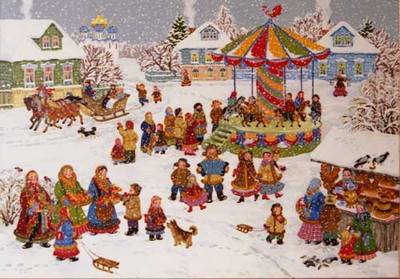
"Maslyana". Lutius. Maslyana or Maslyana Tizden - Christmastide Tizden before Great Lent. Maslyana vshanovuyut with merry festivities, well-done games, riding on horseback, joyful peace. And in the booths to bake a mlints, a specific language dish, like a table from a glibin 'mint went into Russian life. At the rest of the saints, the rice of the Yazichnyts' farewell to the winter and the celebration of spring and the Christian rite was accepted before the ear of Great Lent, before the great saint of Easter, the Resurrection of Christ.
"Maslyana" is a whole picture of a folk festivities, de malovnichi moments to enjoy the sound of music and music, to the wild sounds of folk instruments. The whole nibi is composed of a kaleidoscope of small pictures, but one changes one by one, with the permanent turnings of the first ones. Behind the help of non-grabbing rhythmic figures, Tchaikovsky is opening a picture of full-bodied and radio-sounding viguos, preventing them from dancing. Vibuhi smіhu і a tamnichny whispering angry in one yaskravu і line of a picture is sacred.
"Pisnya zhaivoronka". Berezen:"The field is filled with squares,
There is no illusion of light.
Spring zhayvoronk_v sp_vu
Black without one more "
A. N. Maikov
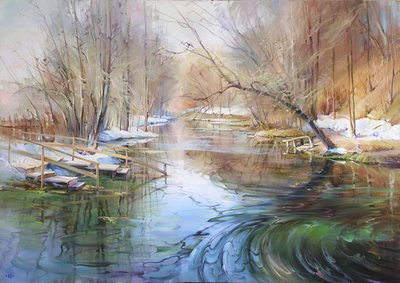
"Pisnya zhaivoronka". March. Zhayvoronok is a bird of Poland, yak in Russia I can play yak in spring I will sleep a bird. It is a tradition for the spy to mingle with the arrival of spring, awakening from the winter squirrel of all nature, with the ear of a new life. The picture of the spring Russian landscape is painted by the simplest, ale wandering around... All music is based on two things: the sound of a lyrical melody with a modest chord-like guide and a friend, a native land, ale with great zeles and wide spirits. In the organically intertwined cycle, there are two themes and different kinds of moods - merry-sumy and light - the polarity of the charm is the belonging of all people. Offended by those who may be the elements, as they think of the trills of the spring song. The first theme is openly framed by more open-ended other themes. Lay down the p'usu of the extinguishing trill of the zhayvoronka.
"Black little clean
Prolisok: Quote,
And for a glimpse
Ostann_y snіzhok.
the rest of the sleep
About grief passed
І pershі mriї
About Happiness ... "
A. N. Maikov
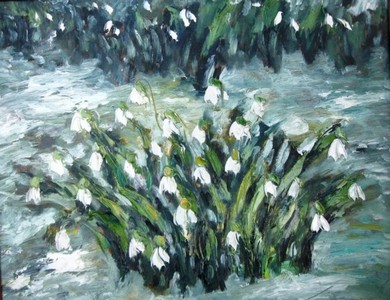
"Prolisok" April. Prolisok - this is the name of the growing line, as it appears right away winter snow... Soundingly chilly, cold, dead, blanching pores, small blaky or large quotations appear at once for the winter snow. Prolisok is still beloved in Russia. Win shanuєtsya yak symbol of new people living life. To you, the assignments of the virshi bagatokh of the Russian poets. P'єsa "Prolisok" is impelled to a waltz-like rhythm, everything is perfected by porous, evil emotions. They have penetratingly conveyed that hvilyuvannya, yake vinikaє when looking over spring nature, І radіsne, prikhovannye in the depths of souls, feeling the hope for a great and secret ochіkuvannya.
"Yaka nіch! Yaka bliss!
Dyakuyu, native opivnichny land!
From the kingdom of ice, from the kingdom of the Khurtovins and the snig
Yak fresher and cleaner your wilderness grass! "
A.A. Fet
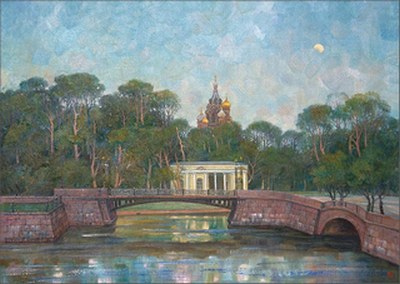
Bili nights - this is how the nights are called in the evening in Russia, since it is so clear at night, as in the daytime. White nights in St. Petersburg, the capital of Russia, were always meant to be romantic festivities and spins. The image of the great nights of St. Petersburg depicted in the canvases of Russian artists and verses of Russian poets. The very same - "Bili Nights" - is called the story of the great Russian writer Fyodor Dostoevsky.
The music of p'usi conveys a change of super-lucid moods: minds to think over the liquorice re-enrichment of the drowned souls on the smiles of the romantic and absolutely extraordinary landscape during the great nights. I will lay down from two great razdiliv, I will enter and change, as unimportant and framing the frame of all p'usi. Entry and Visnovok - a whole musical landscape, an image of great nights. The first part will be on short melodies - zithannya. Smells of nemov are shitting about the quiet of the white nights on the streets of St. Petersburg, about self-reliance, about the world about happiness. Another hassle for the attitude of the partisans and the addicted Hvilyuvannya of the soul is growing, so it is swollen with a radioactive character. Pislya nyogo yde steps go to visnovka (vodolennya) all p'usi. Everyone will calm down, and I know before the listener the picture of the winter, white, light night in the great and strict in its own immovable beauty of Petersburg.
Tchaikovsky boulevard of attachments to St. Petersburg. Here yo youth passed, here I became a composer, here I went through the joy of knowledge and artistic success, here I finished my life living shlyakh and a boathouse in St. Petersburg.
"Go to the shore, there are bad
Our feet will be tsiluvati,
Zirki with a tamnichuyu sum
Be over us syati "
A.N. Pleshcheev
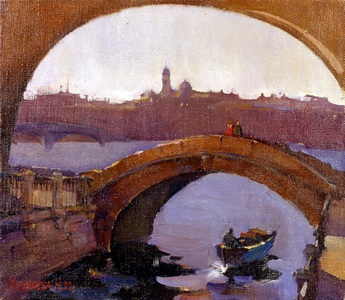
"Barcarolle" Cherven. Barka is a tse іtalіyske word meaning chauven. Barcaroli in the Italian folk music was called the song of the chavnyara, the oarsman. Especially the number of picturesque boules was spreading in Venice, places on the embankments of small canals, every day or at all they were oversubscribed on chambers and at the same time they slept. Pisnі tsі boules, as a rule, sound, і rhythm and accompaniment inherited a smooth flow of channeled fluffy splashes of oars. In the Russian music of the first half of the 19th century, a great expansion of the barcarole appeared. The stench has become a part of the Russian lyric vocal music And also you knew your image in the Russian journey and in painting. "Barcarole" is another Petersburg musical landscape in Tchaikovsky's cycle "Pori Rock". Navigate the name of the p'essa to the pictures of water canals and numerous rivers, on the banks of the old Russian capital of Russia. Warmly and vibrantly sound a wide melody in the first part of p'usi. Vona yak bi "rozgoyduєtsya" on the suprovod, which is traditional for barcarole gitarnі, mandolіnі overflow. In the middle of the music moods change and become more radiant and turbulent, it is dumb to feel the shimmery gooey splashes of khvil. A little later, everything will calm down and know the melody, charming in its beauty, the melody, now in the superconductor not only the accompaniment, but another melodic voice. To sound yak bi blowing two spivaks. We will end up acting to the zealous of all music - the Nemov are willing to go out, and at the same time to see the voices and the noise of the sea.
"Swallow, swing your hand on your shoulder!
You smell in disguise, Winter from noon! "
A. V. Koltsov
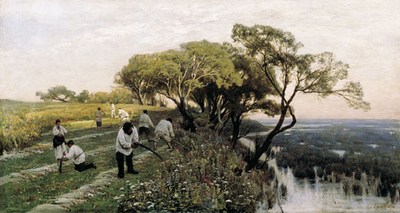
"The mower's song". Sticky. Mowing - tse perevazhno cholovіki, as early-early vrantzi went to the field to mow the grass. Rivnomirnі waving hands and kіs, as a rule, zabіgalisya with the rhythm of labor songs, as the robots slept for an hour. Tsіsnі dreamed in Russia since the founding hours. We slept for an hour, and the herbs were amicably, merrily. Kosovitsa is also a popular storyline in Russian mystery. Yogo were challenged by the rich Russian poets, the Russian artists were recognized in the farbs. And the pissen in the people bulo has been folded without lynch. "The Mower's Song" is a scene from the people's life in Silska. The main melody is to take revenge on the іntonatsії, to tell the folk songs. We have three great parts. The stench is close, one behind the character. I want the first and the third part - tse і є, vlasne, the song of the mower, the peasant, which is fun and energetic to mow the meadow and speak to a wide voice with a wide voice, and at once, rhythmically read the song. In the middle episode, in the big shvidku rusі simple notes of the suprovod, you can almost feel the similarity to the sounds of Russian folk instruments. In the beginning, on a broad-sounding super-conductor, a song will sound familiar; Tchaikovsky loved the whole summer time in the village and wrote in one leaf: "Why is it? Why is it simple Russian land, why is a walk in Russia in the villages in the fields, on the fox, in the evenings on the steppe, I was brought to such a camp, to the earth in a place of Flameness in the flow of love to nature. "
"People are family
Having taken the harvest,
Kositi pid root
Live in the temple!
In copy part
Sheaves are folded.
All the way through the night
Music violinist. "
A. V. Koltsov
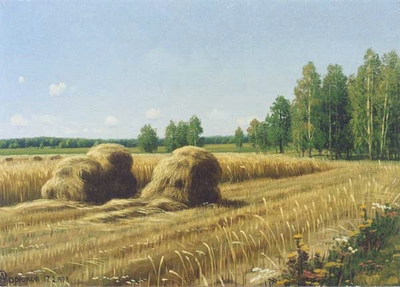
"Stubble". Serpen. Stubble - the price of harvest from the field of mature crops. It's time to live in the life of a Russian peasant - it's time to live. They were praying in the field with a family, as it seems, from dawn to dawn. They slept at a lot. "Stubble" is a great folk scene from the village life. In the manuscript, the composer has broken the title "Scherzo". I in action, "Zniva" - tse open the scherzo for the piano, small I'll decorate the picture from the beating of the Russian hliborob. They have pozhvavlennya, pidyom, characteristic of the great spilnoy robots of the villagers. At the middle part, a picture of a bright folk scene changes over to the lyrical Silskoy landscape, characteristic of the middle Russian nature, on which the scene of stubbles grows. At the sound of a musical fragment, one can see Tchaikovsky's hangings: "I can't imagine why a Russian village, a Russian landscape is charming for me ..."
"It's time, it's time! I will kill the horn:
Psars in Mislivski headdresses
Chim svitlo still sit on horses;
Horthy streaming on the game. "
A.S. Pushkin
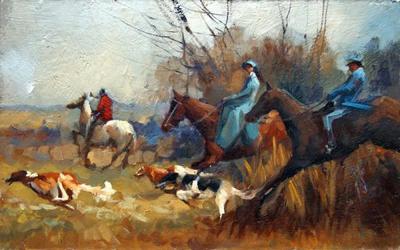
"Polyuvannya". Veresen. Polyuvannya is a whole word, like in all other movs, meaning the promise of wild creatures. However, the word itself resembles the Russian language from the word "polyvannya", which means bazhannya, addiction, pragnennya to chogos. Poluvannya - duzhe characteristic detail Russian side of the XIX century. A lot of sides of the works of the Russian literature are assigned to the whole plot. Imagine a description of a love story about L. Tolstoy's novel, reports and stories of I. Turgenova, paintings of Russian artists. Poluvannya in Russia was determined by the share of people who were smart, strong, and was held even noisily, merrily, in the supervisor of the Misliv horns, without the help of the Misliv dogs. Poluvannya in noble masks in the XIX century, in the main month, it was not a style for the necessary promises, but fun, as it was in all the participants in husbandry, strength, spirits, temperament and excitement.
Autumn, our whole garden is covered with dirt,
Leaves pozhovkle for the wind to fly ... "
A.K. Tolstoy
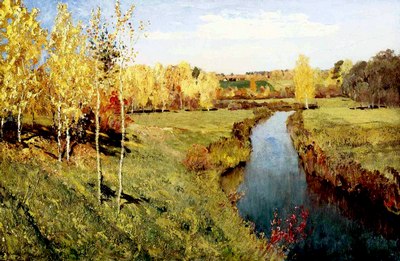
"Autumn Song". October. Autumn in Russia started for an hour, when they tested a lot of writers, singers, artists and musicians. At nіy bachili and unique beauty of the Russian nature, how to dress up in a golden ubіr, shimmer with your writing rich colors. Ale buli and іnshі moments of autumn - a complete landscape, basic in peace with nature and troubles according to the mina lita as a symbol of life. Living in nature in the forefront of winter is one of the most important and summons of life. "Autumn Song" is loaned in a special place. For its tragic flavor of the won є yogo zmistny center, pіdsumkom all raspovіdі about the Russian life and the life of Russian nature. Zhovten, "Autumn Pisnya" is a song of all living things. In the melody, I am overwhelmed by the sum of the іntonatsії - zіtkhannya. At the middle part of the vineyard, it’s perennial, trembling, nagu, the nemov flashed a hope for life, trying to take care of themselves. Ale Third, I repeat the first, once again we will turn to the cob, we will "zitkhan", and even to the hopeless end of life. Prikіntsevі phrases p'єsi with the author's designation "morendo", which means, "zavmiyuchi", as bi do not lose hope for a revival, for the appearance of a new life. The whole p'єsa is a whole lyrico-psychological zamalivka. They have a landscape and the mood of the people, they are angry at one and the same time. "A skinny day, I go for a long walk, I know that there are some quiet little twists in the forest and endlessly, I am soaked with the smell of a disgraced leaf, with the quieter and beauty of the autumn landscape with its characteristic color."
"Do not marvel at the tight road
I don’t keep up with the three
I am sad in my heart
Shvidshe want to extinguish. "
N.A. Nekrasov
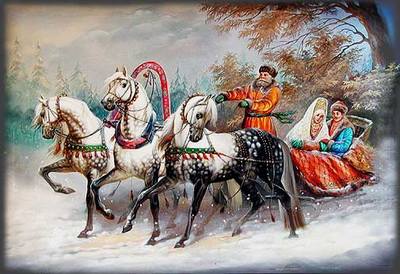
"On triytsi". Leaf fall. Triyka is the name in Russia for horses harnessed at once, under one arc. Before her, little bells were often heard, as when they were on the move, the lunches were played, shimmering with the usual sounds. In Russia, they loved the shvidka ride on trikes, and there were a few folk songs. The emergence of a tsієї p'єsi in the cycle of Tchaikovsky to sleep, I want to finish up the elegant tone, albeit there is a real hope for life. The road in the endless Russian expanses, the three horses - the axis of the symbol of the trivial life. Leaf fall of Russia - tse hocha i Osinniy Mysyats, Ale winter is already fasting in its main viglyadі. "It’s freezing cold, the sun is shining through the ground. The trees are covered with a white shroud, and the winter landscape is so beautiful, it’s important to listen to words," wrote Tchaikovsky. P'єsa repaired with a wide melody, which is like a Russian folk song. I follow her, I feel a sense of seeing sums of money, regular thoughts. A little later, all the closer and closer to mend the sound of the rings, fastened on the three horses. Veseliy peredzin for an hour yak bi muffles the summaries of the mood. And then again, turn the persha melody - the song of the visitor. Їy companion for ringtones. A few moments fade away, and then they call out to dance in the distance, quiet sounds.
Once on a vodokhresny evening
The children were bewitched,
Behind the gate a sliver
They threw them at their feet. "
V. A. Zhukovsky
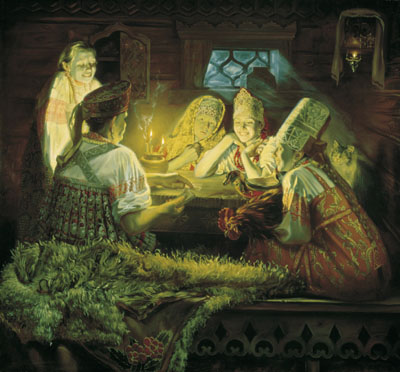
"Christmastide". Breast. Christmastide - an hour from Christmas to Epiphany. Celebration, in which the elements of the Christian rite with the ancient, yazychnitsky were celebrated. On Christmastide, they went from the hut to the hut, the girls were curious about their maybutnya share. At seven panuvav svyatkovy merry. Ryadzheni, dressed not by sound, but by zartom, went on Christmastide from hati to hati, sang Christmas songs, led a round dance. At the booths, they were welcomed, presented with gifts. The p'єsa cycle - "Christmastide" - is concluded in the composer's manuscript with the title "Waltz". It’s not vipadkovo, the waltz bov is also a popular dance, a symbol of family saints. The main melody of the p'єsi of the vitriman is in the style of beat-by-beat music, the fragments of which are decked with waltz episodes. And the end of the p'єsa, і, at the same time with her the whole cycle of a turbulent waltz, a home saint near the beautiful Christmas yalinka.
As an artist, he will describe nature with farbs, a composer and a musician will describe nature with music. From the great composers, we received a collection of works of art in the cycle "Pyro Rock".
It will propose to you to get involved in the music of spring nature, to see the spontaneity and thrill of spring.
A. Vivaldi "Pori rock". Spring
Written in 1723, a cycle of 4 concerts "Four Seasons" was created by Antonio Vivald, one of the most popular music creations of the Baroque era. "Spring" is the first concert from the cycle "Pori Roku".
At the first part of the concerts "Pori Roku" celebrity composer Having hung up the whole month of spring, create three superlatives with joy, barvyly describe the manifestations of nature.
Sonnet Vivald is also divided into three parts: in the first part there is nature, sounding from the winter full, in the other - a shepherd sleeping peacefully, and in the third - a shepherd dancing with nymphs under the veil of Vesnya.
Concert No. 1 in mі major "Spring"
For the idea of \ u200b \ u200bwald the skin season, the singing region of Italy is brought up, and for spring - the whole romantic Venice and the shores of the Adriatic, de especially beautiful sea landscapes and the dream of waking up from the winter slicker Earth.
"Type =" hidden "/>
Vіvaldі Spring
Spring is coming! I am happy to see
Nature. The dream is warm,
Dzyurchat the streams. І svyatkovy news
To distribute Zephyr, like a miracle.
Raptom nabіgayut oxamitі khmari,
Yak blagovist sound heavenly gram.
Ale shvidko can see the whirlwind,
I chirps again in the open space.
Quitiv dikhannya, rustle of herbs,
The nature of the mri.
Sleep shepherd boy, statute for the day,
І bark ledve sensitively dog.
Shepherd's wolf sound
To fly over the bows,
I nimph of dancing charms
Spring raztsvіchenі wondrous exchanges.
Tsikava is not only the old-fashioned baroque form of the musical concert "Spring", but the solo sounding of the instruments: the lower sounds of the violin change with the trembling oboes, the bass step in step, imposed on the melody there, the "flash" appears.
The melody in the first part of the spring cycle is Allegro, there is often a change in rhythm, split, clearly sensitive to the "voice and trill of birds", "dzyurchannya strumka", the lightness of the wind. Another part - Largo, melody, on the protest of the sound of music, a three-layer texture is promoted. The upper layer is the melody solo of the violin, the sound and the troubles. The middle ball of the invoice is accompanied by the quiet rustle of leaves and grass, the sounds of monotonous and kindly sound with the bass of the third ball - rhythmic, which imitates the ice sensitively "yapping of a dog". The third part of the cycle is based on the tempo and dynamism of sounding nagaduє pershu, but here there is also a rhythmically galvanized sound in the skin melodic weakness. The lead hero of the cycle "Spring" Vіvaldі vibrav a vikonuє solo violin, dividing the leather "mіsyats" into three stages: exposition, development and reprise.
P. I. Tchaikovsky "Pori Rock". Spring
"Pisnya zhaivoronka". Berezen"The field is filled with squares,
There is no illusion of light.
Spring zhayvoronk_v sp_vu
Black without one more "
A.N. Maiko
"Type =" hidden "/>
The birch tree is assigned to the first step of the spring cycle, if the lower tendencies make their way through the spring cycle, turn from the virgin birds, and on the thawed patches in the chirp of the jayworns, having played with the caressing bunnies. Spіv zhayvoronka symbolizes spring, for that the melody is lyrical and not capacious, the call of the birds, the wild flight over the native expanses and the opening is easier, the three are summery and the mood. The light trills in steps subside, in the footsteps it’s now, and all the wardens in the ochіkuvanni of the coming day.
The epigrapher to the tsієї p'єsi composer bulo vikoristano virsh of the poet Apollo Maikov, who told about the zhayvoronka flying in the sky, happily singing the praises of spring, letting out the quests and a generous dream.
"Prolisok". Kviten
"Black little clean
Prolisok: Quote,
And for a glimpse
Ostann_y snіzhok.
the rest of the sleep
About grief passed
І pershі mriї
About Happiness ... "
A. N. Maikov
"Type =" hidden "/>
Yak only from the fields and from the fossil galyavins to go to sleep, and on the galiavins they start to make their way through the old leaf and the needles are green grass, there are streaks. Nature awakens, guiding to the light of her first messengers. Yak and a line of prolisok, a month of a week, even more beloved by the Russian people, especially women, who are assigned to singing singing, they are sensitive to the senses, and to guess what is right about those, that spring is still in its possession. The ear of Tchaikovsky's p'єsi "March" is permeated with screaming motives, similar to a quiet, messy waltz, which changes with emotive chords, and then it sounds muffled with major notes. On the cob of the first razdіla p'єsa bolsh povitryan, until the middle of the grave, it becomes more emotional and descends to the lower octaves, and then again turns to a light and sensitive waltz.
The whole musical tvir is also dedicated to one of A.N. Maikova, in which case it is necessary to fight with hope, but it is practically impossible to get rid of it with the hammered bids and the tricycle.
"Bili Nights". Grass
"Yaka nіch! Yaka bliss!
Dyakuyu, native opivnichny land!
From the kingdom of ice, from the kingdom of the Khurtovins and the snig
Yak fresher and cleaner your wilderness grass! "
A.A. Fet
Astor P'iazzolla "Pori roku" Spring
The talent of the composer is polyaga in the minds of visibility, that is, feeling and emotions, as the writer handed over for the help of others, and the artist writes pictures with farbs, which represent the country of yogo internal light, Hourly supervise about the reality. Argentinean musician Astor P'iazzolla, who has created his own powerful and unique musical style, is one of the genial musicians of the 20th century.Astor P'yazzolla turning over the whistle about those who are to blame for the sound of the musician's spirits, which make all three young people for the genre's form into one cocktail. Thus, the emergence of ni from the indifferent style is the divine style of the gris. In its foundation lies a shortcut: tango, jazz and classic music.
Spring. Piazzolla - Primavera Porteña Allegro
"Type =" hidden "/>
A part of the cycle about Pora rock in Buenos Aires is more nagaduє classical tango with an emotional shock, a fiery rhythm and a quick tempo, like an accordion.
Victory to the art can be felt in the interpretations of the orchestras, but the interests of the music critics are not in style, the presentation of tango music is not new;
J. Haydn Oratory "Pori rock". 1st part: Spring
The first part is shown with an instrumental introduction "Transition from winter to spring". The composition of the overture is sub-staged: the intro of an important bass with an inflating atmosphere changes with a soft, light, tonal-stable motive.The instrumental entry of the leather part "Pyr roku", however, deprives the first of them of the vicon's function of the overture until the whole cycle. The head is zavdannya - adjust the listener to the required emotional tone, spend it from the gloomy, in the cold winter frost until the very life - cold and happy spring.
The choir vidda the position of Simon, important to the stubborn bass, which vidriva the solo part "Pyro Rock". Reading the rhythm, squarely budov and the subtlety of the folk spyvayut the listener to the life of the cheerful orach, whose role is the Vicon Simon.
The zagalny tone until the end of "Vesnya" is growing. And with the old choir song, which and end the spring part of the orator.
Cycle of chotir'oh concertos for violin solo and orchestra.
Spring
Axis Came Spring (3)
SPIV PTAKHIV (4)
Ptahs are happy to wind the spring with a cheerful spit, (5-6)
і devilishly in the lower whisper of marshmallows, it is easy to spill over here and there, (7)
and at the end of the hour, the haze is bottled in every hour,
scho the birds need to be zamovknuti. Come new euphonious charm: (12)
there, on a flooded puddle, to foster a look, a little lower whisper of leaves and herbs. (15)
Sleeping SHEPHERD (15)
Sleep the shepherd, but the order of the dog is a true dog. (15)
Vin grumble angrily - yomu ajhe all hour is brought to voice barks. (15)
From the sounds of the shepherd's wolf and from the shining cover of spring, the merry nymphs and the shepherd dance. (eighteen)
Shepherd's Dance (18)
lito
LITNYA znemogi (31)
Leave the trivial hour of fate - it's time for a hot dream, - people grieve, flock herds, pine trees burn. (31)
Turtle Doves (38)
The axis of the turtle-dove in the garden is ready to fold its own songs. (38-39)
Nіzhno vіє zephyr. (40)
ПІВНІЧНИЙ ВІТЕР (41)
Buremni vіtri (41)
Ale raptom Borey is closing the super-spline with his own susid. (42)
SKARGA peasant (44)
The young shepherd will mourn his lot, because he is afraid of the rough huts, which will encumber the flock. (45)
It hurts my legs and arms, and I feel comfortable, because of fear I think about blizzards, about terrible thunderstorms, about grim flies and gadflies! (50)
FLIES І Ovid (50)
Burhlivo LITNYA PORA (53)
It is no wonder the villagers are afraid. It’s getting beaten up: to make up my face, to sing the blinks in the sky, and the axle was already beaten by a hail of ears, more grains. (53)
Have a curl and gurkit. (57)
autumn
Dancing and PISNI settle (72)
Sacred villagers with dances and songs. (72)
The joy has come from the chosen one. (72)
ONE drunk (75)
Bacchus' volos have styles of fun! (75)
І ALL DRINKS (76)
AXIS CHEY VIPIV! (80)
Spitting P'yaniy (83)
Burkhlive sacredly end with a blissful dream. (83)
Sleeping P'YANI (86)
Everyone wants to see from there, dance, dance. An unhealthy food to bring malt. (86)
For an hour the rock is getting more and more and more and more cliche, we feel the liquorice sleep. (86)
Myslivtsi from early rush to the meadow, with towels and carabiners to sleep in the wild.
Everybody is alive to hide, to the sound, and to the misleading, to re-listen. (96)
Back in the hijack (96)
Yogo whistle. The axle is already wounded, the victim is overlapped, and it is blocking and playing the barking of the dogs, and the shooter from the rushnitsa. (96)
STRILBA Z towels and barks of dogs (96)
WILD ZVIR I GINE (101)
Win is weak, very weak, in the world, in winter. (101)
winter
Tremite frozen mandrіvnik under cold snow. (106)
ZHAKHLIVIY VITER (107)
Suvoro dme terrible viter (107)
NOISE ВІТРУ (113)
People run around, all hour dulling their feet against the cold, (109)
I would like to be wrapped in wool, not to eat one tooth for a tooth. (117)
Smell to kick your donkey: it is also so nice and peaceful to fire in the fire, while they were angry, they were running the booth behind the walls. (123)
People walk on the ice of the river. (126)
GO CAREFULLY, with the beaten and full of crocus, respectfully quit, do not bother and do not fall. (128)
Varto, speed up the croc chi, turn around with a sound, as you skip and fall. (128-129)
PADINNYA ON THE GROUND (129)
Ale people go shvidshe, left the ice without shaking and not seeing the splinters. (132)
PIVDENNO-SHIDNIY VITER (133)
See, if you go outside the door, how to dim Sirocco, Borey, and all the three are fighting among themselves. (135)
Such is the winter, ale and won’t bring joy. (138)
We will fall in love with the genre Antonio Vivaldi (bl. 1678-1741), who was nicknamed "rudim priest", having a concert, with the power of svyatkov_styu, blisky, great touch, - in a word, style, rooted in a wide, versatile and spragly yaskravich feud audit.
12 years old in the Vivald family, having replaced his father in the short orchestra, and in 15 years he took a black dignity. In 25 rockies Vivaldi became the first violinist of his native place - Venice, ten years later he became one of the most famous composers of Europe. Black dignity allowing Vivald to become a musical reference book of the Ospedalle della Pieta woman conservatory. Todi in conservatories began to build up to music for children from 7 to 18 years. The main features of the conservatory are the preparation of personnel for the opera house: spivak, spivochok, orchestra students, composers. Vіvaldі vikladіv vikhovankam spіv, gru on harpsichord, violin, flute, general bass and counterpoint (written music). However, the heads of the robot have lost their performances to the Conservatory Orchestra, or, as they said, drops. In the orchestra we played a lot of girls. From the critical Vivald, the stench reached such a majesty, which at the beginning of the hearing came from the best children of Europe. The composer himself played with the chapel as a soloist-violin and a concert hall for a great number of concerts, more than 450.
Concert creativity of Vivald has become a member of the instrumental music the baroque style (baroque - "wondrous", "chimeric" style). Bagato Concerts Antonio Vivaldi Mayut the Program - it’s called or to find a literary dedication.
The cycle "Pori Roku" is one of the earliest shows of the programmed orchestral music. Pori roku (Italian. Le quattro stagioni "Chotiri pori roku") - the first chotiri from twelve violin concerts of the eighth opus, one of the most famous creatures and one of the most recent musical works in the baroque style. The concerts were written in 1723 and were published for the first time two rockets, after that, in 1725, in Amsterdam - the singer Michel Le Tsini. A leather concert of dedication to one rock and consists of three parts, similar to the skin month. The composer presented a sonnet to the skin with concerts - a literary program of his own. Transferred, by the author of the verses є Vivaldi himself. It is necessary to add that the paradigm of the baroque artistic imagination cannot be intertwined with one sense or the plot, and the transmission of the slightest sense, pretensions, symbols. The first to ask for an allusion - chotiri vіku people, from the people to death (the final part is to take revenge on the unprecedented tension on the rest of Dante's inferno). Nastilki, there is a lack of tension on the chotiri of the region of Italy, but on the sides of the light and the path of the sun across the sky. Tse shid (skhid, Adriatica, Venetsia), noon (sleepy, hot pivday), pesny zhid (Rome, Latius) and winter (cold in front of the Alps, with frozen lakes). But in the whole zmіst cycle they are meaningfully rich, but it was clear to any modern, well-known hearer (div. Philip Bossan, "Louis XIV, the king-artist", "Mezhi Olimpu"). At the same hour, Vivaldi can be reached here from genre and straightforward imaginativeness, but not to humor: in the music of the presence of dogs, the sound of flies, the roar of a wounded animal, etc. masterpiece.
Ale Vivald gave the musicians a more detailed program. In the score, in the parts of the soloist and in the parts of the third instruments, the explanation is not only to the skin news by those, Ale і to the action of short musical phrases: the stench to clarify the zmіst, bringing in new energy and humor. Chotiri concert cycle - "Spring", "Lite", "Autumn", "Winter" - barvistically paint pictures of nature. Vіvaldі into the distance to transmit in the music of spіv ptahіv ("Spring", in the first part, "Lito", in the first part), a thunderstorm ("Lito", in the third part), importantly without falling ("Winter", in the other part), noise vіtru. The virtuosity, the technical foldability is not in the ears of the listener, but has taken the root of the image, so that it will be remembered.
Kozhen from chotir'oh concerts are composed of 3 parts, contrasting between themselves: shvidko-povіlno-shvidko.
1 Concert No. 1 in m major "Spring", RV 269
2 Concert No. 2 in sol minor "Lito", RV 315
3 Concert No. 3 in F major "Osin", RV 293
4 Concert No. 4 in fa minor "Winter", RV 297
Concert No. 1 in m major "Spring", RV 269
1 Allegro. Spring has come
2 Largo e pianissimo semper. Sleeping shepherd.
3 Allegro, danza pastorale. Silsky dance
Spring is coming! I am happy to see
Nature. The dream is warm,
Dzyurchat the streams. І svyatkovy news
To distribute Zephyr, like a miracle.
Raptom nabіgayut oxamitі khmari,
Yak blagovist sound heavenly gram.
Ale shvidko can see the whirlwind,
I chirps again in the open space.
Quitiv dikhannya, rustle of herbs,
The nature of the mri.
Sleep shepherd boy, statute for the day,
I barking ledve sensitively dog.
Shepherd's wolf sound
To fly over the bows,
I nimph of dancing charms
Spring raztsvіchenі wondrous exchanges.
Concert No. 2 in sol minor "Lito", RV 315
1 Allegro non molto. Spec. Allegro. Zozulya. Gorlinka. Zephyr. Boreas. The crying of a peasant.
2 Adagio - Presto.
3 Presto, tempo impetuoso d'estate. Summer thunderstorm.
In the fields, the flock is wandering.
From the heavy, suffocating spec
Guardian, everything in nature dries up,
We all live on with the spragoy.
RAPTOM NALITAK PRESTRIAN AND MAYBOY
Borey, calm quiet calm.
Nearly dark, angry gnats.
І weeping shepherd boy, drowning in a thunderstorm.
In view of fear, bidny, head of the world:
B'yut bliskavki, gurkoche grim,
I stigle ear of virivaє
Thunderstorm stabs mercilessly.
Concert No. 3 in F major "Osin", RV 293
1 Allegro, ballo e canto de'villanelli. Dance and song of village boys.
2 Adagio molto, Ubriachi dormienti. Sleeping p'yani.
3 Allegro, la Caccia. Poluvannya.
I am sacred to rustle the villagers.
Cheerfully, smіkh, incendiary pisen dzvin!
I Bacchus sik, set fire to the roof,
To blame all the weak, give a licorice dream.
And the decision to pry the prodovzhennya
Ale spіvati and dancesuvati still carried.
I, completing the joy of nasol,
In the best dream of all zanuryu nich.
And vrantsi on svitanka jump to the pine forest
Myslivtsi, and with them geri.
I, next to know, let the hounds go down,
Recklessly zvira to marry, to surmount in rіg.
Perelekanija zahlivy gamor,
Wounded, scho weaker utikach
From psіv to torment to live for the first time,
Ale often guine, nareshty.
Concert No. 4 in fa minor "Winter", RV 297
1 Allegro non molto
Tremtish, freezing, in a cold snow,
On the first day of the week, the sickness began to accumulate.
With cold teeth knocking on the big
Pounding with your feet, you can't get away
Yak liquorice in a calm, warm and quiet
From the evil scoundrels, get caught up in the winter.
Stone fire, reminiscent of mirages.
I froze souls with peace of mind.
On the winter expanse of the radio people.
Having fallen, having licked, and kitten again.
І radіnо sense, yak rіzhetsya lіd
Let's go with a conic, scho zaliz of fetters.
And in the sky, Siroko z Borі zіyshlisya,
Ide is not on the heat, there is a battle with them.
I wish it was cold and the hurtovina didn’t stay away,
Give us winter and our own nourishment.
For the first parts of his concerts (shvidko) Vivaldi having set up the form of a rondo. Head topic for tutti to turn at the viglyadі refrain, swallowing with solo episodes of the developmental type. Thematically, the stench is tied with a refrain, pozichuyu in new material; But here, in episodes, those of the completed budov and razchinyayutsya in sequential-figurative movement. The theme is reliably emphasized by episodes, but it is a flowing, ruhomous background, not very imaginative in nature.
A. Vіvaldі is not very compassionate about his music programmatically. With the whole program of this chi іnshiy creator, the composer then intervening with a singing heading ("Shepherdess", "Vidpochinok", "Favorite"), then he created a picture of skin parts in a cycle. It’s just that in his glorified 4 concertos for violin, string quintet and organ (or something). At the current viconavian practice, the stench is combined into the cycle "Le quattro stagioni" - "Chotiri pori roku" (in the original of such a title is not):
- Concert E-dur "Spring" (La primavera)
- Concert g-moll "Lito" (L'estate)
- Concert "Autumn" (L'autunno)
- Concert "Winter" (L'inverno)
Kozhen s concerts can play a literary program, a vicladen in 4 sonnets: "Spring", "Lite", "Autumn", "Winter". Mozhlivo, їkh by the author of the book himself Vіvaldі (the authorship is not precisely established).
Spring
Spring is coming! I am happy to see
Nature. The dream is warm,
Dzyurchat the streams. І svyatkovy news
To distribute Zephyr, Like chari.
Raptom nabіgayut oxamitі khmari,
Yak blagovist sound heavenly gram.
Ale shvidko can see the whirlwind,
I chirps again in the open space.
Quitiv dikhannya, rustle of herbs,
The nature of the mri.
Sleep shepherd boy, statute for the day,
I barking ledve sensitively dog.
Shepherd's wolf sound
To fly over the bows,
I nimph of dancing charms
Spring raztsvіchenі wondrous exchanges.
lito
In the fields, the flock is wandering.
From the heavy, suffocating spec
Guardian, everything in nature dries up,
We all live on with the spragoy.
RAPTOM NALITAK PRESTRIAN AND MAYBOY
Borey, calm quiet calm.
Nearly dark, angry gnats.
І weeping shepherd boy, drowning in a thunderstorm.
In view of fear, bidny, head of the world:
B'yut bliskavki, gurkoche grim,
I stigle ear of virivaє
Thunderstorm stabs mercilessly.
autumn
I am sacred to rustle the villagers.
Cheerfully, smіkh, incendiary pisen dzvin!
I Bacchus sik, set fire to the roof,
To blame all the weak, give a licorice dream.
And the decision to pry the prodovzhennya
Ale spіvati and dancesuvati still carried.
I, completing the joy of nasol,
In the best dream of all zanuryu nich.
And in the morning on the svitanka jump to the pine forest
Myslivtsi, and with them geri.
I, next to know, let the hounds go down,
Recklessly zvira to marry, to surmount in rіg.
Perelekanija zahlivy gamor,
Wounded, scho weaker utikach
From psіv to torment to live for the first time,
Ale often guine, nareshty.
winter
Tremtish, freezing, in a cold snow,
On the first day of the week, the sickness began to accumulate.
With cold teeth knocking on the big
Pounding with your feet, you can't get away
Yak liquorice in a calm, warm and quiet
From the evil scoundrels, get caught up in the winter.
Stone fire, reminiscent of mirages.
I froze souls with peace of mind.
On the winter expanse of the radio people.
Having fallen, having licked, and kitten again.
І radіnо sense, yak rіzhetsya lіd
Let's go with a conic, scho zaliz of fetters.
And in the sky, Siroko z Borі zіyshlisya,
Ide is not on the heat, there is a battle with them.
I wish it was cold and the hurtovina didn’t stay away,
Give us winter and our own nourishment.
Let us explain the remarks, like commenting on the musician, with the help of musical episodes to the cycle "Pori Rock". So, for example, in the first part of "Winter", the composer reaches the heights of artistic imaginativeness, remarks to explain how those images appear here, like knocking teeth out of the cold, like dulling with their feet, scribbling. Nothing similar did not go right up to Beethoven's "Pastoral" symphony.
The concerts have a rich genre and sound-visual details. Here, the presence is not only a gurkit thunder, and a thunderbolt, ale and a bark of dogs, flies, the roar of a wounded beast, and to see the images of the pilgrims from the villagers with an unsteady pace. From the first part of "Vesnya", the music will be reminiscent of the "radio sleep" of birds, the fun of the dzyurchans, the lower ones of the marshmallows, like a snarling thunderous squall. "Lito" yaskravo zmalovuy assertive "gurkit thunder". "Autumn" conveys the mood of folk festivals, saint. At "Winter" ostinatnoy "bitty" of 8 maisternally transmit the vision through the winter cold. At the same time, the head of the composer will be overshadowed by the transfer of the main emoticon camp.
In the skin concert cycle "Pori Rock", most parts are written in parallel (in relation to the main) tonality. Їх music is seen from the dynamic Allegri.
Yaksho vrahuvati, all 4 concerts are trilateral, then there is no parallel in 12 months of rock. In addition, the theme is popular in the mystery of the feast of admitting the meaning of parallels - to the Persha, with the natural life cycle of people from the people to death. You can also allyuze on the chotiri region of the Italian, as well as on the sides of the light.
The life of one of the most recent composers, who is alive for more than 300 years, is completely viral in a solid Internet encyclopedia, distributed on other important (and not even worse) sites from additional author's birthday. Here і try to re-point (abstracts) і і і і і і in the style of Dan Brown, and just "create on the theme" of other authors, innocently poked in their interests all the same text.
Naybіlsh tsіkavі materіali, as you like, were known in the list of the poetic list. The stench is imposed on music scientists, professional musicians, who spiral in their robots on specific documents and facts.
Mabut, the finest visual of such materials about Vivaldi and yogo "Time to Rock" є, was written by the onuk of the renowned composer S. Maikapar - Oleksandr Maikapar and published by him on the Vlasny site -.
The lack of credibility, lightness and logic in the history of historical material in the whole statty has become for us the right point in the history of our light-music production. A part of the materials from the statistic, with the author's beloved permission, was posted on our website.
Otzhe, "Pori Rooku" by Antonio Vivaldi, a cycle of chotiroh concertos for solo violin and orchestra. Leather with concerts in three parts and leather image one time for rock. The stench to enter the warehouse of zboriv (Op. 8), I will call it "Il Cimento dell'Armonia e dell'Inventione"
Warehouses - approximately in 1720 (A. Vivaldi 32 roku). Published - 1725 (in 5 years!). Amsterdam. Vidavets Michel Le Tsini. The new original name is "Le quattro stagioni" ("Chotiri pori roku").
"Prete rosso" ("Rudy priest") - also pristily retracted Antonio Vivaldi from the memoirs of Carlo Goldoni. І action, wіn bouv і rudim ("Rudiy" - bulo prіzvisko і yogo dad), and a priest.
Antonio Vivaldi (4 birch 1678, Venezia - 28 linden 1741, Week) was born in the homeland of the professional squeak, his father was a grave in the Cathedral of St. Mark, and also took part in opera performances. Antonio renounced the church's sanctification and became a priest: he last became an exorcista (exorcist; 1695), acolythus (chresny batko; 1696), subdiaconus (protodeacon; 1699), diaconus (deacon; 1700). Aleksei nezabaromly, since he was a priest of sacerdos (priest; 1703), he gave him the right to independently serve the world, breast cancer). In 1703, the maestro di violino was listed in Ospedale delle Pieta. Tse one of the venets_ansky pristulk_v for girls-children. With a break in two rock Vivaldi took over the tsyu posad until 1716 rock, if he became a maestro de 'concerti. Formerly, even though they are still far away from Venice, they wondered about their calls from Piet (at this hour they sent two of their new concerts).
The reputation of Vivald has grown rapidly with the first publications: trio sonatas (jimovirno 1703-1705), violin sonatas (1709) and especially 12 concerts "L'estro armonico" ("Harmony of nature") Op. 3 (1711). The stench, the performances of the most beautiful concerts, the boules of vision in Amsterdam and widespread in pivnichniy Europe; tse zmusilo musicians, as they saw the Venezia, rozshukuvati there Vivaldi, and in the row of vipadkіv to replace the new, as the tse bulo, for example, was destroyed for the Dresden court. Bach was so honored with Vivaldi's concert, which five concerts Op. 3 wines cross for harpsichord, and a number of concerts for organ. bagato nimetski composers have inherited their style. I've seen two collections of sonatas and many other concerts, including "La stravaganza" ("Extravagance") Op. 4 (approx. +1712), "Il cimento dell'armonia e dell'inventione" ("Supercross of Harmony with Winachod"), Op. 8 (c. 1720, including Chotiri Pori Roku) and La cetra (Lyra), Op. 9 (1727).
Itself in the genre of an instrumental concert is the arrangement of the head of the state of the art of Vivald and its significance in the history of music. Winn was the first composer, who gradually became victorious in the form of a ritournel in vivid parts, and it became an eye for other composers. The same can be said about the Vivaldian form of the concert as a whole, which is composed of three parts: shvidko - povilno - shvidko. About 550 concerts, about 350 - for solo instrument and orchestra (more than 230 for violin); close to 40 subdivisions (tobto for two soloists), more than 30 for decal soloists and mayzhe 60 for orchestra without soloists. Vіvaldі buv by the original instrumentalist and having written a number of concerts for non-wanderers іnstruments, for example, for wіoli d'amur і lutes, and for useless spiritual instruments, including such, like a shaker New also has a lot of solo concerts for bassoon, cello, oboe and flute. Deyakі z yogo concertіv - programs, for example "Storm on the Sea" (so I will call three concerts), "Polyuvannya", "Trivoga", "Vidpochinok", "Nich", "Proteus, abo Svit Navivorit". Vіvaldі having written also rich vocal - church and svіtskoy - music. Winn the author (for winter tributes) from 50 - 70 operas (saving close to 20).
The theme of pyro rock is popular in mystery. Explained by the tse of bureaucrats. In the first place, the won gave the power by means of this particular mystery to fix the subject and right, the most characteristic for that hour of fate. In a different way, you won’t give me singing philosophical zmist: The spirit of fate was looked at in the aspect of the period of human life, and in this aspect, so that the awakening of natural forces, took off the ear and symbolized youth, and - for the day - old.
The history of music means the famous interpretations of those pir rock. Do so and be called "Pori rock". A cycle of concerts by Vivaldi, oratoria by Haydn (1801), a cycle of piano pieces by P.I. Tchaikovsky (1876), ballet by A.K. Glazunov (1899).
"The Seasons" by Antonio Vivaldi will stay until the number of the most popular creations in every hour. For the bagatokh it is the same name “Vivaldi” є the synonym for “Pyro rock” and navpaki (I want to write the masu of the first creatures). Navigating in the occasional concert with the same opus and concert demonstrates Vivaldi's innovation in the field of baroque concert. Predivimosya to the skin with chotiroh concerts. And from the very ear I mean that the composer presented a sonnet to the skin of concerts - a literary program of his own. Transferred by the author of the verses is Vivald himself (here and the sonnets are induced in the crossbar of Volodymyr Grigor'ev). Otzhe ...
Spring (La Primavera)
Spring is coming! I am happy to see
Nature. The dream is warm,
Dzyurchat the streams. І svyatkovy news
To distribute Zephyr, Like chari.
Raptom nabіgayut oxamitі khmari,
Yak blagovist sound heavenly gram.
Ale shvidko can see the whirlwind,
I chirps again in the open space.
Quitiv dikhannya, rustle of herbs,
The nature of the mri.
Sleep shepherd boy, statute for the day,
I barking ledve sensitively dog.
Shepherd's wolf sound
To fly over the bows,
I nimph of dancing charms
Spring raztsvіchenі wondrous exchanges.
"" (L'Estate)
In the fields, the flock is wandering.
From the heavy, suffocating spec
Guardian, everything in nature dries up,
We all live on with the spragoy.
RAPTOM NALITAK PRESTRIAN AND MAYBOY
Borey, calm quiet calm.
Nearly dark, angry gnats.
І weeping shepherd boy, drowning in a thunderstorm.
In view of fear, bidny, head of the world:
B'yut bliskavki, gurkoche grim,
I stigle ear of virivaє
Thunderstorm stabs mercilessly.
"Autumn" (L'Autunno)
I am sacred to rustle the villagers.
Cheerfully, smіkh, incendiary pisen dzvin!
I Bacchus sik, set fire to the roof,
To blame all the weak, give a licorice dream.
And the decision to pry the prodovzhennya
Ale spіvati and dancesuvati still carried.
I, completing the joy of nasol,
In the best dream of all zanuryu nich.
And in the morning on the svitanka jump to the pine forest
Myslivtsi, and with them geri.
I, next to know, let the hounds go down,
Recklessly zvira to marry, to surmount in rіg.
Perelekanija zahlivy gamor,
Wounded, scho weaker utikach
From psіv to torment to live for the first time,
Ale often guine, nareshty.
"Winter" (L'Inverno)
Tremtish, freezing, in a cold snow,
On the first day of the week, the sickness began to accumulate.
With cold teeth knocking on the big
Pounding with your feet, you can't get away
Yak liquorice in a calm, warm and quiet
From the evil scoundrels, get caught up in the winter.
Stone fire, reminiscent of mirages.
I froze souls with peace of mind.
On the winter expanse of the radio people.
Having fallen, having licked, and kitten again.
І radіnо sense, yak rіzhetsya lіd
Let's go with a conic, scho zaliz of fetters.
And in the sky, Siroko z Borі zіyshlisya,
Ide is not on the heat, there is a battle with them.
I wish it was cold and the hurtovina didn’t stay away,
Give us winter and our own nourishment.
Dali in his statti A. Maikapar to produce in the edge of the tsikavi tribute about the development of musical diversity, vicarious Vivaldi in the concerts "The Seasons", the composer's remarks in the scores, hour and mice, if done. Vin describes in detail a leather concert, going from verses to notes and not forgetting about Vivald's reality. Yogo article good read, especially for musicians, one hour listening to recordings of concerts (try to know the best performance on the Internet) and sometimes hostility from read and felt. I sing along, don't Vi don't talk about vitraction for an hour.
I think that it’s not all admirable hearings to know about the sonnets, which play the key role not only with the Vicon, but with the help of the creation. And there are still not many viconavts, who are sure to follow the author's idea of Vivaldi. At the musical collection "Theater of the Svit", 5 (!) Viconan "Pir Rock" was selected close. The range of interpretation of the majesty is from the authentic classic pre-jazz avant-garde.
Having read a blinking article by A. Maikapar, we did not respect the well-known visuals of our sonnets. We knew і victoriously in staging another version of the vikonannya, so it is ideal to go to our gaze to the cob idea of Antonio Vivaldi - program music.
The program of music is a whole lot of music, as a result of the literature program. At "Pora Rock" I can do it efficiently with the help program: the music just follows the images of the verses. Sonnets are so kind to bring up musical forms of concerts, why don't you fold the sonnets to the already written music?
Look to play in our staging practically all program changes of Vivaldi - wind and boards, spiv ptahiv, dance nimph and love scene. However, we were honored to enter into the ideas of the great composer - the vision of nature. The nature of the Italian art (marvel at the map, there is a Venetsia) madly m'yakshe Russian. It is unlikely that Vivald bachiv the beauty of the Russian winter, witness the contrast and sadness of the middle of autumn, the temperament and inertness of the end of the snowless leaf fall. To that we were honored to construct a number of parts of the third (Autumn) and fourth (Winter) concerts so, as bachimo tsi perіody rocky, the inhabitants of the middle rivnina, having feared the enemy in the even more common music of the tsikh parts.
History of life of Antonio - Luchio Vivaldi - also outside of me the composer is mostly pratsi, experiments, innovations and selfless service to the art. With a hand on the edge of an active life (he died at 62), do not marvel at the ailments and the authorities, be it a citizen of the country, it is not for people that they have their own genetic talent.
Yak often trap, people paid evil for good. Antonio Vivald has died of vivacity and self-reliance, far from Batkivshchyna. Mysce yogo buried in the grave for the people near Vidnia (Austria) has long been ruined. Yogo concert will be forgotten for 200 rockets and just for the ear of 20 centuries (circa 1934) his creativity has been born and it has become a new gift to people the enchanting light of wonderful music.
Before the speech, Lyuchi (another іm'ya Vіvaldі) in the crossbar means "light".
Oleksiy Goltikhov
